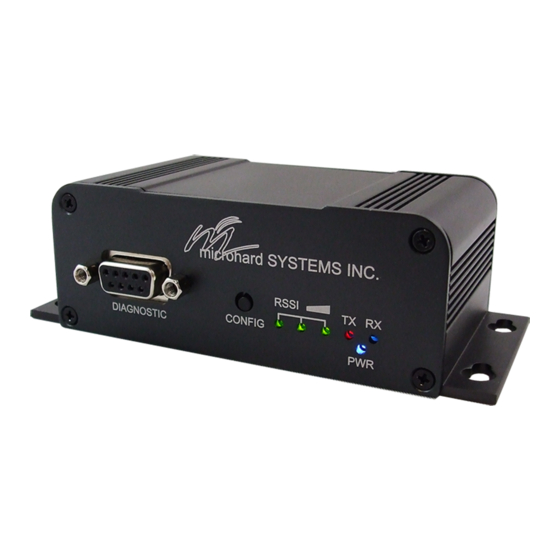Subscribe to Our Youtube Channel
Summary of Contents for Microhard Systems n920
- Page 1 Operating Manual n920 900 MHz Spread Spectrum OEM Transceiver Revision 0.10 April 16, 2008 Microhard Systems Inc. #17, 2135 – 32 Ave N.E. Calgary, Alberta T3K 4Z4 Phone: (403) 248-0028 Fax: (403) 248-2762 www.microhardcorp.com...
-
Page 2: Warranty
Warranty Microhard Systems Inc. warrants that each product will be free of defects in material and workmanship for a period of one (1) year for its products. The warranty commences on the date the product is shipped by Microhard Systems Inc. Microhard Systems Inc.’s sole liability and responsibility under this warranty is to repair or replace any product which is returned to it by the Buyer... -
Page 3: N920 Regulatory Requirements
WARNING: Changes or modifications not expressly approved by Microhard Systems Inc. could void the user’s authority to operate the equipment. This device has been tested with MCX and Reverse Polarity SMA connectors with the antennas listed in Appendix A When integrated in OEM products, fixed antennas require installation preventing end-users from replacing them with non-approved antennas. -
Page 4: Table Of Contents
Contents Warranty ..................................ii Warranty Diclaims................................ ii Indemnification................................ii Proprietary Rights................................. ii n920 Regulatory Requirements ........................... iii CONTENTS ................................IV GENERAL ................................1 ................................ 1 RODUCT VERVIEW ..............................2 UTPUT OWER EVEL INSTALLATION..............................3 ..................................3 VERVIEW ............................3 STIMATING THE ARGIN .............................. -
Page 5: General
The small-size and superior RF performance of this module make it ideal for many applications. While a pair of N920 modules can link two terminal devices (“point-to- point” operation); multiple modules can be used together to create a network of various topologies, including “point-to-multipoint” and “repeater”... -
Page 6: Output Power Level
While the typical application for the N920 is to provide a short- to mid- range wireless communications link between DTEs, it can be adapted to almost any situation where an asynchronous serial interface is used and data intercommunication is required. -
Page 7: Installation
3. Installation 3.0 Overview The N920 complies with FCC part 15 at the modular level for operation in the license-free 902-928 MHz ISM band. This chapter provides guidelines for installing and deploying equipment which incorporates the N920 module. 3.1 Estimating the Gain Margin... - Page 8 Figure 1 Gain Calculation The power level has been set to 30dBm (1W) on the transmitter, and the receiver sensitivity for the N920 is -108dBm. System gain would be calculated to be: 30 - 2 + 6 + 3 - 2 + 108 = 143 dB.
-
Page 9: Antennas And Cabling
-95dBm. 3.2 Antennas and Cabling This section describes the recommended procedure for installing cabling and antennas for use with the N920 module. 3.2.1 Internal Cabling The most common method for installing the module is to run a cable from the module’s MCX connector to a reverse TNC bulkhead connector on the... -
Page 10: Installing External Cables, Antennas And Lightning Arrestors
Direct human contact with the antenna is potentially unhealthy when the requirements for mobile N920 is generating RF energy. Always ensure that the N920 equipment is transmitting devices, a separation powered down during installation. At all times a distance of 23 cm must be... - Page 11 See appendix A for a list of approved antennas that can be used with the N920 radio modem. If you require another type of antenna please WARNING: contact Microhard Systems Inc. The N920 CANNOT be used with any Be careful with dBi vs dBd gains antenna that does not appear in Appendix A.
- Page 12 36dBm with respect to the isotropic radiator. Example 1) What is the maximum power the N920 can be set to comply with FCC and IC given the following equipment given a Rubber Ducky Ant Gain 2dBi and no cable or connectors in the system? Max EIRP 36dBm Max TX power = EIRP –...
- Page 13 6dBd, 900 MHz Omni Directional Antenna Bluewave, RPTNC Pigtail WARNING: Changes or modifications not expressly approved by Microhard Systems Inc. could void the user’s authority to operate the equipment. This device has been tested with MMCX connectors with the antennas listed in Appendix A When integrated in OEM products, fixed antennas require installation preventing end-users from replacing them with non- approved antennas.












Need help?
Do you have a question about the n920 and is the answer not in the manual?
Questions and answers